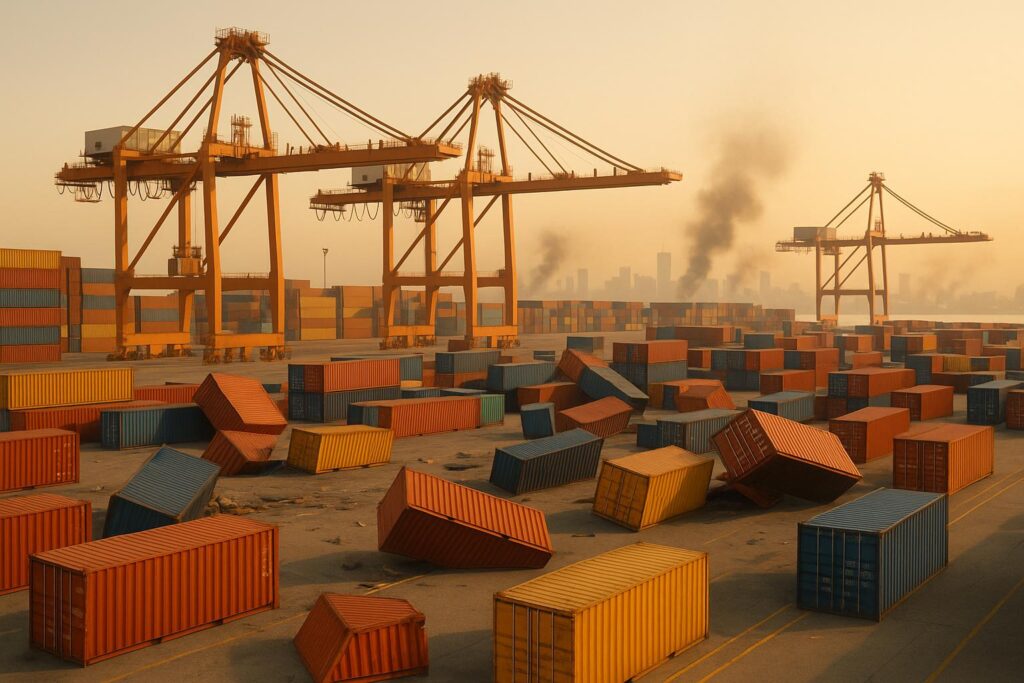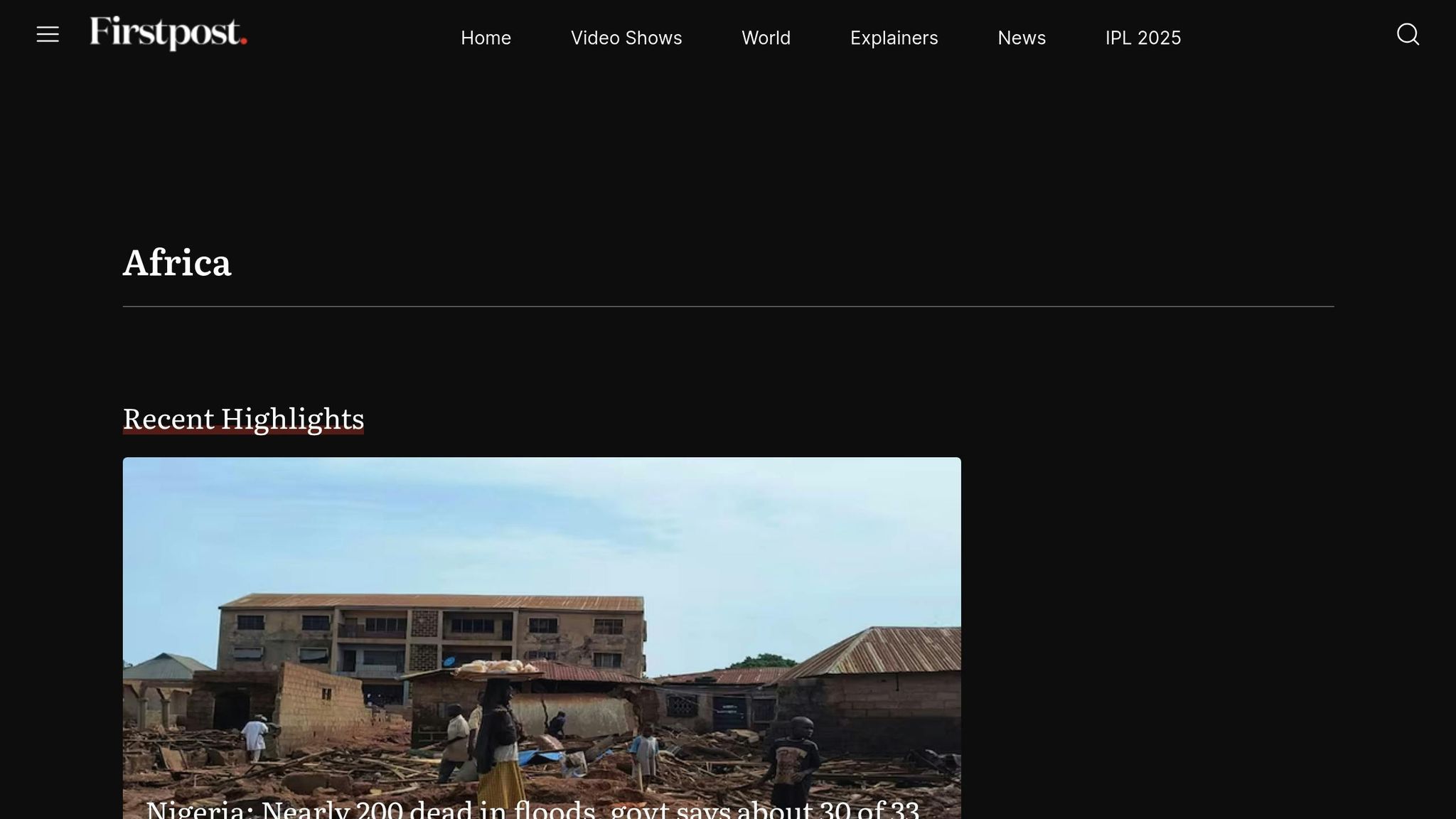Political violence disrupts export businesses by destabilizing supply chains, increasing costs, and causing financial losses. Events like wars, terrorism, and civil unrest can halt operations, raise shipping expenses, and lead to unpaid invoices.
Key Impacts:
- Supply Chain Chaos: Ports close, routes are blocked, and shipments are delayed.
- Higher Costs: Rerouting, insurance premiums, and security expenses surge.
- Financial Losses: Contracts are canceled, and buyers may default on payments.
Solutions:
- Diversify Markets: Spread operations across multiple regions to reduce dependency.
- Strengthen Supply Chains: Use multiple suppliers and invest in technology for resilience.
- Insurance Protection: Secure policies like Political Violence Insurance and Accounts Receivable Insurance to safeguard assets and cash flow.
Exporters face growing risks, but with smart planning and insurance, they can navigate these challenges and stay competitive.
Mozambique Violence: Key Trade Routes Affected as S. Africa Shuts Main Border | Firstpost Africa
How Political Violence Disrupts Export Operations
Political violence can throw export operations into chaos almost instantly. Because global trade is so interconnected, even conflicts in small, localized areas can ripple through supply chains, destabilizing exporters’ financial footing. Let’s break down how supply chains, costs, and revenue streams are affected.
Supply Chain Disruptions
When political violence breaks out, transportation networks are usually the first to take a hit. Ports shut down, highways get blocked, and damaged infrastructure can bring shipments to a standstill, pushing exporters to scramble for alternative routes.
For instance, by March 2024, attacks by Houthi forces caused trade through the Suez Canal and Bab El-Mandeb Strait to drop by 50%. In response, many shipping companies rerouted vessels around the Cape of Good Hope, doubling traffic along that route.
Manufacturing doesn’t escape unscathed either. During Kenya’s 2008 post-election violence, about half of the workforce was unable to report to their jobs at the height of the unrest. This led to production stoppages and supply shortages that rippled through export markets.
A vivid example comes from Kenya’s flower export industry during this same period. Weekly export volumes from affected areas plummeted by 56% on average. Even larger companies with established buyer contracts struggled, as clients sought to shift their sourcing to regions untouched by the violence.
Higher Operating Costs
Political instability also drives up costs across the board. Rerouting shipments to avoid conflict zones means longer transit routes, higher fuel bills, and increased crew expenses. For example, after Houthi attacks disrupted Red Sea shipping lanes in late 2023, vessels had to take the much longer route around the Cape of Good Hope, significantly raising transportation costs.
Insurance premiums are another area where costs climb. Exporters operating in unstable regions face higher rates as insurers adjust for the heightened risks. On top of that, companies may need to pay premium wages or hire extra security to protect their goods and facilities, further inflating operational expenses.
Lost Revenue and Canceled Contracts
These rising costs only add to the financial strain caused by lost revenue. Political violence creates market uncertainty, which can lead to delayed shipments, penalties for missed deadlines, and even outright order cancellations. Buyers may also push for price reductions to offset the risks they face.
Take Bangladesh in 2013 as an example. During a period of frequent political strikes from July to December, the prices of time-sensitive Bangladeshi goods dropped by 1.59% on average. Importers demanded discounts to compensate for the increased likelihood of delays.
Contract cancellations are another common fallout. For instance, Russia’s invasion of Ukraine in 2022 severely disrupted global agricultural exports. Ukraine’s wheat and corn shipments plummeted globally, except in Europe, leaving exporters grappling with canceled contracts and shrinking market shares.
These challenges highlight the critical need for strong risk management strategies, which will be explored in the next section.
Insurance Solutions for Political Violence Risks
Exporters face unique challenges when political violence disrupts their operations. To navigate these risks, specialized insurance solutions provide essential financial protection. These policies address various aspects of political risk – ranging from property damage to unpaid invoices – offering businesses multiple layers of security to safeguard their investments and operations.
Political Violence and Civil Unrest Insurance
Political Violence and Civil Unrest Insurance is designed to cover losses stemming from events like terrorism, riots, strikes, and armed conflicts. Unlike standard business insurance, this coverage focuses on the specific risks associated with operating in politically unstable areas.
The protection offered by these policies is broad. They cover property damage caused by riots or terrorist attacks, business interruption expenses when operations are forced to halt, and even potential loss of life in severe cases. This type of insurance ensures businesses can recover from financial losses tied to political violence, civil unrest, or war, allowing them to maintain stability during turbulent times.
The demand for this coverage is growing. Chris Beck, President of Clements Worldwide, highlights the increasing frequency of violent political events:
"It appears that violent political events such as terrorism, war, riots, civil unrest, and labor strikes are occurring more frequently, and are no longer isolated to known, politically unstable areas on the globe."
The statistics reinforce this concern. Violent political events surged by 90% in just one year, and one in four global organizations has been affected by such incidents. Additionally, Allianz identifies around 100 countries as being at "high or extreme risk of civil unrest," underscoring the widespread nature of these threats.
These policies often work in conjunction with other solutions, such as Accounts Receivable Insurance and Political Risk Insurance, to provide comprehensive protection for exporters.
Accounts Receivable Insurance
While property-focused policies address physical and operational risks, Accounts Receivable Insurance protects exporters from financial losses caused by non-payment during political instability. Political upheaval can lead to foreign buyers defaulting on payments, leaving exporters vulnerable to significant financial setbacks.
This insurance specifically covers receivables owed by international customers, acting as a safeguard against disruptions in payment cycles caused by political events. With this coverage, exporters can confidently extend credit to foreign buyers, even in volatile markets. Policies can also be tailored to address the specific political risks associated with each target market, ensuring exporters are adequately protected.
Political Risk Insurance
Political Risk Insurance (PRI) offers the most comprehensive protection for exporters dealing with political threats. While other policies may focus on specific risks, PRI covers a wide range of political events that could disrupt international business. It also allows for customization, ensuring coverage aligns with the unique risks of each region.
This type of insurance protects businesses from arbitrary government actions such as expropriation, nationalization, confiscation, and forced divestiture. It also addresses issues like license cancellations, breaches of contract, and selective discrimination. In addition, PRI provides extensive political violence coverage, including damage to assets and the forced abandonment of operations during violent events.
PRI goes further by addressing trade-related challenges, such as export and import restrictions stemming from economic competition between nations. It also covers situations where foreign exchange controls block remittances, ensuring that businesses can recover their investments even when traditional payment channels are disrupted.
Together, these insurance solutions equip exporters with the tools they need to manage risks and maintain stability in an unpredictable global landscape.
sbb-itb-2d170b0
Practical Ways to Manage Political Violence Risks
Export businesses can’t entirely avoid the risks tied to political violence, but they can take smart steps to reduce its impact. Effective risk management blends strategic planning with financial safeguards, ensuring operations can continue even in turbulent political climates.
Diversify Export Markets
Relying too heavily on a single market can leave your business vulnerable to political instability. By spreading your operations across multiple countries or regions, you can reduce the impact of unrest in any one area. Diversification helps maintain steady revenue streams since political violence rarely affects all regions at once.
Take TechCorp, an electronics manufacturer, as an example. They expanded into Southeast Asia and South America while diversifying their supplier base. This move reduced their reliance on Country A and softened the blow of political and economic risks in their primary market.
Currency diversification is another layer of protection. Political violence often leads to currency devaluation, so having revenue streams in multiple currencies acts as a natural hedge against such fluctuations.
Before entering new markets, it’s crucial to research their political stability, history of civil unrest, and policies toward foreign businesses. Political instability can lead to trade barriers, asset expropriation, or abrupt tax policy changes. Being informed about these risks helps you make smarter decisions about where to expand.
Build Stronger Supply Chains
A resilient supply chain is just as important as market diversification. By spreading your suppliers across different regions, you reduce the risk of disruptions caused by political violence in a single area. This approach ensures you have alternative sourcing options when your primary suppliers are impacted.
Laure Augugliaro, Senior Underwriter for Crisis Management & Special Risks, highlights the value of this strategy:
"Continuously assess and diversify exposures to risks and build resilience to shocks by diversifying their supply chains and reinforcing their protection, among other things."
Identifying and qualifying suppliers in multiple regions before a crisis hits can save you from scrambling for alternatives later. Additionally, fostering strong relationships with suppliers in stable regions can improve reliability and create partnerships that withstand political pressures.
Investing in technology is another key component of supply chain resilience. Tools like real-time tracking, automated procurement processes, and digital communication systems can keep operations running smoothly, even when traditional channels are disrupted. A robust trading system also requires resilient infrastructure for transportation and communication.
Ultimately, an effective supply chain strategy combines geographic diversification with operational flexibility. As Augugliaro notes, managing political violence risks requires more than just insurance – it demands a global approach that includes strategic planning, risk prevention, and swift reactions.
Include Insurance in Risk Management Plans
Insurance is a critical part of any risk management plan, especially when political violence can disrupt operations and finances. Policies covering political violence and terrorism can protect businesses against the financial fallout from events like insurrections, social unrest, or acts of terrorism.
The numbers underscore the urgency. Since 2017, over 800 major anti-government protests have occurred in more than 150 countries, with 160 significant events reported in 2024 alone. Of these, 18% lasted more than three months, illustrating that political violence often creates long-term instability.
Allianz Commercial explains why businesses can’t afford to ignore these risks:
"Political violence remains a top 10 global business risk according to our customers because politics is increasingly perceived as being dominated by populism and blame and division, geopolitics by nationalism and a changing world order, and economics by mismanagement, corruption, and continually rising disparity between the ‘super rich,’ ‘rich,’ and the rest."
When crafting an insurance strategy, consider a mix of coverage types. Political violence insurance can cover events like war, rebellion, and coups, while terrorism insurance addresses physical damage and business interruptions caused by politically or ideologically motivated acts. For export businesses, Accounts Receivable Insurance is especially useful, protecting cash flow when political disruptions prevent foreign buyers from paying.
With the right insurance in place, businesses can confidently explore opportunities in emerging markets, knowing their financial exposure is protected. A thorough risk assessment – covering physical assets, supply chain vulnerabilities, and revenue streams – is essential for tailoring insurance to your specific needs. This integrated approach ensures stability and resilience, even in volatile regions.
Conclusion: Protecting Export Businesses from Political Violence
Main Points
Export businesses face significant challenges from political violence, including supply chain disruptions, rising costs, and lost revenue from canceled deals. These risks are not hypothetical – they are increasing steadily, with over half of businesses worldwide identifying civil unrest and strikes as their top concern.
The financial toll is staggering. Recent incidents have led to billions in insured losses. For exporters, political strikes can be particularly harmful, with multi-day strikes reducing the likelihood of a firm exporting by 6.30 percentage points.
To counter these risks, successful export businesses adopt proactive strategies like diversifying markets, strengthening supply chains, and securing insurance coverage tailored to their specific needs. These measures ensure resilience and stability in an unpredictable global environment.
How Insurance Supports Financial Stability
In the face of political volatility, comprehensive insurance solutions play a vital role in maintaining financial stability. Insurance serves as a cornerstone of global trade, safeguarding assets and mitigating risks in uncertain markets.
One critical form of protection is Accounts Receivable Insurance, which shields a significant portion of export businesses’ assets from both commercial and political risks. This ensures that even during periods of unrest, cash flow remains steady, allowing businesses to operate without interruption.
Mike Libasci, President of International Fleet Sales, shares how this insurance has transformed his business:
"Accounts receivable insurance has allowed us to take on customers and transactions we wouldn’t have felt comfortable taking on by ourselves… It has not only allowed my company to take on larger deals, but be more liberal in terms, and the result has gone straight to our bottom line."
Ori Ben-Amotz, Chief Financial Officer of Hadco, highlights its competitive edge:
"With [accounts receivable] insurance, we don’t have to ask for cash up front or payment on delivery, which makes us much more competitive. This is the tool we needed to take more market share from our competitors."
Export accounts receivable insurance is more than just a safety net – it’s a strategic asset. By integrating it into their risk management plans, businesses can confidently navigate the complexities of international trade. This approach helps ensure continued operations, stable cash flow, and growth, even in the face of political violence and global uncertainty.
FAQs
How can export businesses manage the financial risks of political violence?
Export businesses can shield themselves from the financial fallout of political violence by using political risk insurance (PRI) and implementing smart operational strategies. PRI offers coverage for losses stemming from events like civil unrest, terrorism, or other political instability. This helps protect businesses from property damage and interruptions to operations. On top of that, export accounts receivable insurance provides a safety net against non-payment risks caused by political upheaval, offering a layer of financial security in unpredictable markets.
To limit disruptions, exporters can take steps like adjusting shipping schedules to avoid high-risk times or rerouting shipments through safer regions. For instance, companies operating in politically unstable areas have effectively reduced costs by fine-tuning their logistics and reallocating resources. By combining thoughtful planning with reliable insurance options, export businesses can face political uncertainties head-on while keeping their financial health intact.
What is the difference between Political Violence Insurance and Political Risk Insurance, and how can they work together to protect export businesses?
Political Violence Insurance (PVI) and Political Risk Insurance (PRI) each address different challenges that arise from political instability, but together they can offer a more complete safety net. PVI is designed to cover losses stemming from politically driven acts of violence, like terrorism, riots, or civil unrest. This typically includes protection against physical damage to property and the financial consequences tied to such events. Meanwhile, PRI focuses on non-violent political risks, such as government expropriation of assets, restrictions on currency transfer, or the cancellation of contracts, all of which can disrupt business operations.
For export businesses operating in regions prone to instability, combining these two types of coverage can provide a well-rounded shield. This dual approach not only protects physical assets but also ensures financial stability in the face of both violent disruptions and broader political hurdles, helping businesses navigate uncertain environments with greater confidence.
Why is it important for export businesses to diversify their markets and supply chains in politically unstable regions?
Diversifying markets and supply chains is a smart move for export businesses, especially those operating in regions prone to political instability. Relying too heavily on a single market or supplier can leave companies vulnerable to disruptions caused by regulatory shifts, transportation delays, or even trade restrictions. These challenges can quickly translate into financial setbacks and operational hurdles.
By branching out into multiple markets and collaborating with a variety of suppliers, businesses can cushion themselves against localized disruptions and keep goods moving steadily. This approach not only helps maintain stability but also builds resilience, making it easier to adjust to unpredictable changes while protecting revenue. Plus, tapping into new markets can open doors to growth and spark fresh ideas, keeping businesses competitive in an ever-changing global landscape.




